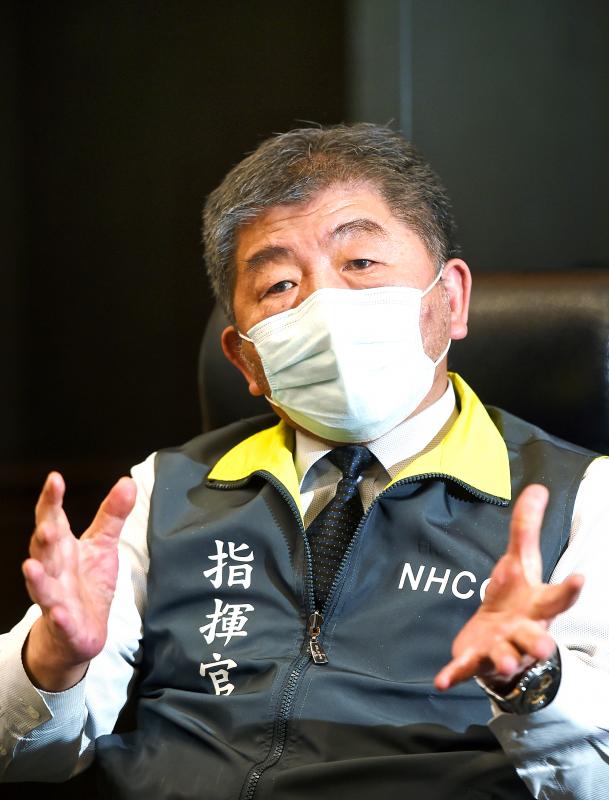The government would begin easing some border restrictions by Wednesday at the earliest, Central Minister of Health and Welfare Chen Shih-chung (陳時中) said on Saturday.
The new measures would include allowing the entry of foreign business travelers, Chen, who heads the Central Epidemic Command Center (CECC), said in an interview with the Liberty Times (the Taipei Times’ sister newspaper).
Those entering on business visas would be subject to the same quarantine rules as returning Taiwanese nationals, he said.

Photo: Fang Pin-chao, Taipei Times
However, if special circumstances arise, the CECC would establish “business travel bubbles” under which business travelers would be subjected to shorter quarantine periods, he said.
COVID-19 “measures must be implemented scientifically. Tightened rules are introduced step by step, and now loosening of the rules must also be done step by step,” he said. “If there are no unforeseen circumstances, then we will move toward reducing the barriers to border entry.”
Borders are currently open only to foreigners with residence permits, special diplomats and those on humanitarian missions. Under the new rules those who meet the requirements of a business visa would also be allowed entry, with no consideration for which country they are arriving from, he said.
Quarantine periods would be gradually reduced to 10 days from the current 14 days, according to safety considerations, he said, adding that where arrivals are quarantined — whether in a central facility, quarantine hotel or residence — would depend on the number of COVID-19 vaccine doses they have had.
“There is already scientific evidence that those who do not test positive for COVID-19 within a 10-day period are not a transmission risk to others,” he said.
The CECC is moving toward increasing the ratio of home quarantine, he said, adding that its is the most cost-effective and convenient solution for people, and the public has been cooperative in following home-quarantine rules.
“If people are fully vaccinated and are able to stay in a residence on their own, or in one room of a residence on their own throughout the quarantine period, then a longer home-quarantine period is feasible,” he said. “However, we have to take things one step at a time.”
Since international arrivals need to book airline tickets, quarantine hotels and make other arrangements that might be difficult to change on short notice, the CECC would update the quarantine regulations monthly, instead of every two weeks as is currently done, he said.
Loosened border restrictions would be accompanied by increased testing, and rapid testing kits for use in the home would be the first line of screening, he said.
Asked about opening borders to tourists, Chen said that would not happen until later, and business travelers are the government’s first priority.
“The impact of lost business deals will spill over into the following years, but tourists who do not come this year could still come next year,” he said.
Additional reporting by Yang Yuan-ting and Chiu Chih-jou

ACTION PLAN: Taiwan would expand procurement from the US and encourage more companies to invest in the US to deepen bilateral cooperation, Lai said The government would not impose reciprocal tariffs in retaliation against US levies, President William Lai (賴清德) said yesterday, as he announced five strategies to address the issue, including pledging to increase Taiwanese companies’ investments in the US. Lai has in the past few days met with administrative and national security officials, as well as representatives from various industries, to explore countermeasures after US President Donald Trump on Wednesday last week announced a 32 percent duty on Taiwanese imports. In a video released yesterday evening, Lai said that Taiwan would not retaliate against the US with higher tariffs and Taiwanese companies’ commitments to

‘SPECIAL CHANNEL’: Taipei’s most important tasks are to stabilize industries affected by Trump’s trade tariffs and keep negotiations with Washington open, a source said National Security Council Secretary-General Joseph Wu (吳釗燮) arrived in the US for talks with US President Donald Trump’s administration, a source familiar with the matter said on Friday. Wu was leading a delegation for a meeting known as the “special channel,” the Financial Times reported earlier. It marked Trump’s first use of the channel since returning to the White House on Jan. 20. Citing a source familiar with the matter, the Financial Times reported that Minister of Foreign Affairs Lin Chia-lung (林佳龍) was also a part of the delegation. The visit came days after China concluded war games around Taiwan and amid Trump’s

CHIP EXCEPTION: An official said that an exception for Taiwanese semiconductors would have a limited effect, as most are packaged in third nations before being sold The Executive Yuan yesterday decried US President Donald Trump’s 32 percent tariff on Taiwanese goods announced hours earlier as “unfair,” saying it would lodge a representation with Washington. The Cabinet in a statement described the pledged US tariffs, expected to take effect on Wednesday next week, as “deeply unreasonable” and “highly regrettable.” Cabinet spokeswoman Michelle Lee (李慧芝) said that the government would “lodge a solemn representation” with the US Trade Representative and continue negotiating with Washington to “ensure the interests of our nation and industries.” Trump at a news conference in Washington on Wednesday announced a 10 percent baseline tariff on most goods

Intelligence agents have recorded 510,000 instances of “controversial information” being spread online by the Chinese Communist Party (CCP) so far this year, the National Security Bureau (NSB) said in a report yesterday, as it warned of artificial intelligence (AI) being employed to generate destabilizing misinformation. The bureau submitted a written report to the Legislative Yuan in preparation for National Security Bureau Director-General Tsai Ming-yen’s (蔡明彥) appearance before the Foreign Affairs and National Defense Committee today. The CCP has been using cognitive warfare to divide Taiwanese society by commenting on controversial issues such as Taiwan Semiconductor Manufacturing Co’s (TSMC, 台積電) investments in the